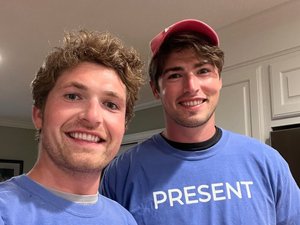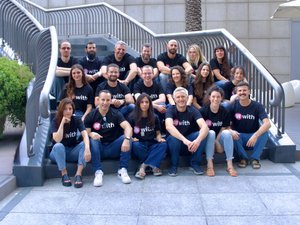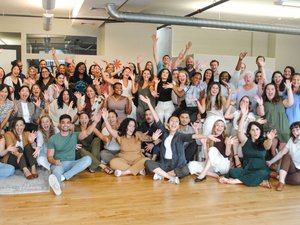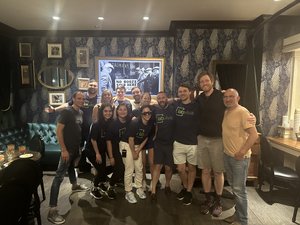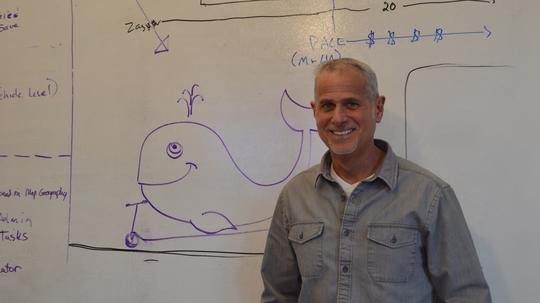
After more than a year of stops and starts, microtransit company Zagster has tapped private transit leader Dan Grossman as its new CEO.
Grossman has been riding the microtransit wagon for a while now. Prior to coming to Boston, Grossman served as CEO of San Francisco-based, Ford-owned private shuttle company Chariot until it shuttered in January, citing low ridership. Before that, Grossman was chief operating officer and a founding leader of Maven, General Motors’ car-sharing service. Prior to that, he served as vice president of Zipcar, giving him 10 years of experience altogether in the realm of transit-focused startups.
Grossman comes to the 11-year-old Zagster in the company’s time of turmoil. Last February, Zagster raised $15 million in a Series C funding round. But less than a month later, the company laid off an undisclosed number of employees in an organizational “restructuring.” More layoffs hit the company in August, and the company gave BostInno a similar statement. Since then, Zagster appears to have pivoted toward partnerships, steering somewhat away from the traditional bikesharing service it was known for and focusing instead on operations.
That’s where Grossman thinks Zagster’s future lies. “[We’re] going to these other companies that own these assets, that want to rapidly deploy in big cities,” he said. “That’s really where our new vision is headed to.” Last month, the company announced a partnership with scooter startup Spin in several cities, and the two companies recently launched new scooters in Knoxville, Tennessee. (Scooters are catching on in the Boston area: Brookline launched a pilot program this month with the companies Lime and Bird, while Boston is waiting on a state law to change before it authorizes scooters on its streets.)
Plus, Grossman wants to put the speed bumps behind. “Zagster got big, then it got small, and now it’s starting to grow again,” he said. “I wouldn't have come here if that was a concern.”
BostInno sat down in the company’s downtown offices to talk about Grossman’s history, the future of micromobility, and where Zagster fits into this multimodal scene.
So tell me. What's your vision for Zagster, high-level?
Well, high-level, the auto industry is changing more in the next five years than it has in the last 50. The whole owner-buyer model is shifting. I’ve spent time at Ford and General Motors in the last five years, and they know they're going to start selling fewer cars. And you have fewer younger people getting driver's licenses. We have people in this office that don't have a driver's license, because they don't need a license. In dense markets like Boston, New York, Chicago, San Francisco, there's great transit options. And when you need another option, you've got micromobility, whether it's bikes, scooters, or other things that you can use. Even when you think of the ridesharing options.
So we fit into that ecosystem specifically with our pedal business. Then more recently, our operations-as-a-service arm is now going to these other companies that own these assets, that want to rapidly deploy in big cities. We can take our decade of experience in these cities and do it bigger, faster than they can—and cheaper. You look at a Zagster market where we've got a phenomenal relationship with the city. We can bring a partner into that market and then provide the labor and the technology to deploy it quickly, and then monitor it to ensure that it's a service for their customers.
What do you think makes Zagster stand out from a company like LimeBike, or Ford GoBike or other similar services?
Everything's competitive. When pricing is about the same, as a consumer, you're going to pick what works best for you and what’s most reliable, and that's, I think, what Zagster does really well. We've got hundreds of employees not here, but out in the field. That's all they do. We've got this technology that we've launched, called Wrangler, that provides all the data and support we need to know where we need to be, when we need to be, and to make the service better. We want, you know, attrition. In the scooter-bike business, you can lose these assets.
What we saw early on was that we're able to mitigate [potential losses] with our technology and get ahead of it. We find that these companies are buying our service, which is predictable. It's something that you don't have to invent and create a separate work. We already have that. And I think that's starting to resonate in the market.
To focus a little bit now on your background, you have a ton of experience in the microtransit sector with Zipcar, Maven, and Chariot. What lessons have you taken away from these companies?
Yeah, I learned a lot.
Tell me.
Quite honestly, when I got into car sharing, I wasn't sure that it was that great an idea. I was kind of like, “Three to five people share a car, like, how does that work?” We were then taking that to markets for the first time, you know, going to Denver, San Diego, Portland and Seattle, and trying to convince citizens that this is something that could work for you. And in markets like Portland, it was great, because we had bought a company called Flexcar. They had a head start. In other markets, it was very different. But it started kind of taking hold.
Building on those learnings, after seven years, GM called and wanted to create a mobility division. I was the first external talent they brought up with mobility experience. Within a very short period of time, we created Maven from the ground up. It didn't even have a name when I got there. We created this thing from scratch and deployed it in 17 markets in 10 months, using all the kinds of things that I learned at Zipcar, understanding the characteristics in markets where shared mobility makes sense. Then, I went to Ford and took that to Chariot as CEO. Chariot I kind of look at as car sharing with 14 seats, with an Uber or Lyft kind of functionality. You reserve a seat, we come pick you up, we drop you off at around where you want to go. And again, same characteristics: rider, car ownership, don't want to deal with congestion but let somebody else do the driving. It just fit in.
Ultimately, it wasn't the right thing for Ford. But Ford was a great owner, a great partner. And that allowed me to then come here and assume this role, now applying 11 years in shared mobility, to a pretty strong team. The operational expertise here is amazing. And so I can come in here and now add value to all the good things that these folks are doing. Even in a small company, when you've been around over 10 years, that's no joke. You've got some sort of secret sauce. And I think now we're trying to apply it to things that are bigger and probably more meaningful for the market today.
When Chariot did, unfortunately, shut down in January, one of the reasons that was given to the press at the time was simply that there wasn't enough ridership. They weren't attracting enough customers. So what lessons do you take from that? And how do you go forward and attract the customers you need to make a microtransit business financially viable?
Yeah. So it directly applies here. Chariot was an asset-heavy business; it had a very long roadmap to sustainability. So you own hundreds and hundreds of vehicles, you have hundreds and hundreds of employees driving these vehicles, you have this massive infrastructure. And yeah, that costs a lot. Ford and Chariot had to make the right business decision: What should we do with the business? And so that decision was made. Again, Ford was a great thought leader and business partner throughout this, but coming here, our pivot is to asset-light. The foundation of Chariot was asset-heavy, owning bikes, deploying bikes, and then having people manage those bikes. Now pivoting to operations as a service, where others own the assets and we manage the operation, is a more predictable kind of business model. And we're not carrying the depreciation insurance, we're not carrying all of these costs to our partners, but what we're giving our partners, who are carrying these costs, is what I think is a better chance of success, and success of higher utilization, higher revenue per day, on your asset, in better attrition, in lower missing vehicles. This is an appropriate template based on my experience, which is more asset-heavy businesses.
Zagster is going to be focusing specifically on bikes and now on scooters. Am I correct here?
Yes. Bikes and e-bikes. We're going to have an e-bike product, which is pretty interesting. And then mostly operating scooter businesses for others.
What do you think are the advantages of bikes and scooters over other forms of transit?
I wouldn't say there's an advantage. I think the advantage is based on the trip type. If you're going a mile, a mile and a half, a scooter is perfect. It’s perfect! Drop it off for a couple of bucks, move on. If you're going to, say, the market or doing longer errands that might be going an hour or more, I think a bike is probably more appropriate. If you're going to do your week or two weeks’ worth of shopping at Whole Foods on a weekend, then it's maybe a car, because you've got multiple bags. And so it's within this ecosystem, when it's right for the trip type for one of our products, we want to win that trip. I'm not going to win a trip to go to Newport for the weekend. That's not going to be a scooter or a bike. But I want to win the trips that fit into that appropriate trip type that I described. We want to have the ability to offer a service where you're going to see the price and the availability and it makes sense in a competitive market to choose us.
One of the criticisms, as I'm sure you're aware, of bike-sharing and scooter-sharing services—and microtransit services at large that are private—is that they're potentially taking riders away from public transit systems, and therefore potentially degrading the public transit systems over time. What is your response to that?
You know, I've seen data suggesting different sorts of modality could potentially be eroding transit, I don't—again, going to trip types, you know, a short mile-long scooter trip I'm not sure is really competing with transit. That's competing with maybe walking, to be perfectly honest with you. In your bike example, it’s station-based, meaning it's not floating; you have to put it in a specific place. I think our version of the services is less likely to be a significant contributor to eroding transit ownership and others.
Yeah. I know for me, personally, I rented a bunch of the e-scooters in San Francisco. The choice was not, “Do I take a scooter or do I take two buses?”—because that was what the option was. It was, “Am I going to take a scooter, or am I going to take a Lyft or an Uber?” If I chose the scooter, it was because it was usually cheaper and would take about the same amount of time.
Theoretically. Like I took Caltrain—you know, Fourth and King [Station]—and then our office was across from the new Salesforce Tower. There's no other option, other than a rideshare company, to go from point A to B as quickly as a scooter or a bike. And that's why when you get off the train, you see all the Ford bikes, and all the scooters that are great because you can just go, you can take a direct route. And it's probably faster and cheaper than transit. Micromobility, I think, competes less than potentially rideshare services. I haven't seen the specific data, but I think that there could be some examples in certain cities. And then, let's face it, then it's up to transit to get a service that can then compete with that. Then there’s cities like New York that have congestion pricing, which I'm sure you’ve read about it.
I have, yeah.
That affects every microtransit service and rideshare service on a per-rider, per-seat basis. [Author’s note: New York City’s congestion pricing rules will not be finalized until November. Early plans indicate the city would charge car and truck drivers per vehicle, which would not affect cyclists, skateboarders, etc.] So we'll see. You know, I've never been a big fan of caps without data to kind of lead the way. I think cities that are considering those things have to really analyze enough data to understand why that's the right thing. A microset of things we do, I think, kind of squeeze into the middle of that, and they’re less likely to contribute to that sort of congestion.
Since we're talking about regulation, how are you, and how is Zagster, planning to work with local regulators going forward?
Well, I just got here. From what I can tell, because of our decade-long experience working with these municipalities, we have very strong relationships with city and city government. I think that's one of our advantages to then help our scooter partners enter some of these markets. If we have successfully operated a pedal business for many years, then there's probably that sort of credibility with the city, to think that we will be able to operate a different business with the same sort of people and structure just as well. That's where I think we're going to see some really big wins.
Now, I'd be remiss if I didn't touch on this, but Zagster itself, just last year, had two rounds of layoffs and is I'm sure undergoing some more transformation as a company. What are you going to bring to Zagster to make sure that people retain their jobs, and that you're commercially viable going forward?
Yeah, well, quite honestly, I think a lot of companies have that sort of history. I would look at it more as a pivot, making sure that you have a workforce that fits the new kind of business model. And so the business model has shifted. If you went on our website, we have job openings. And they just hired me to come out here from San Francisco and thought my background would be appropriate for this sort of pivot. That's all I really look at. Even Ford and General Motors have had massive, white-collar executive layoffs, because the quotes are, their businesses pivot into a ton of different things—in AI and other things. You need a workforce that can accommodate that pivot. That's, quite honestly, what I think happened here. Zagster got big, then it got small, and now it’s starting to grow again. In our employee ranks, I mean, we have so many people out there, this is like the second and third week. The fact that we're able to attract, given what you just said—we're still able to attract top talent, in the market, with people with this kind of micromobility experience. Again, I wouldn't have come here if that was a concern. I'm more excited about our future than looking at the past.
Absolutely. Are you excited to be in Boston, having come from the Bay Area?
I love it. I was seven years at Zipcar, and they were in Cambridge and the Seaport. I was here two or three times a month. Love the town. I have an apartment here, and I'll be residing here the majority of the time.
Are you going to be bicoastal?
I'll be here the majority of the time. I haven't sold my house, but I have an apartment, I have a lease, I got my Charlie Card. I've only made a mistake a couple times; I’ve only been scolded twice by doing something wrong. I went through the wrong door and didn’t scan my card, and the other time I got on at the wrong place. And I’ve only been honked at one time. I’m learning from the locals.
What are you most excited about in your new role at Zagster?
Just the opportunity to work with this team as they pivot to these new offerings, and to be able to add value based on my decade of experience in shared mobility. To apply it here to advance and speed up all the things that we want to do and really reestablish kind of Zagster as this operational expert in shared mobility, in micromobility.
